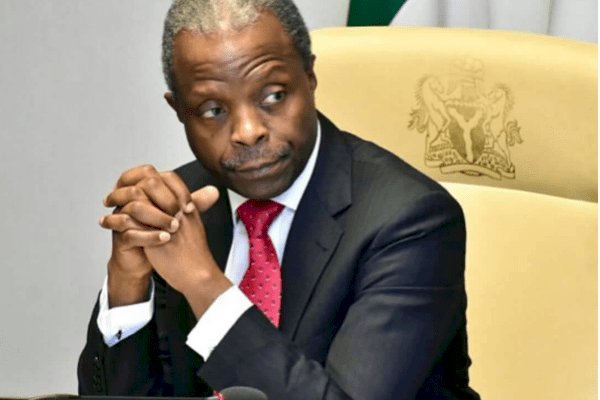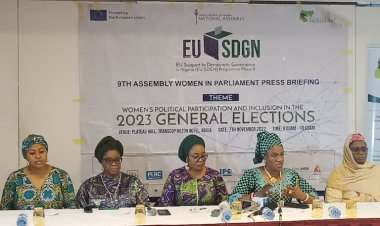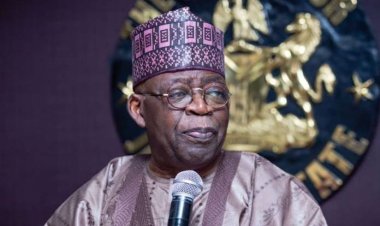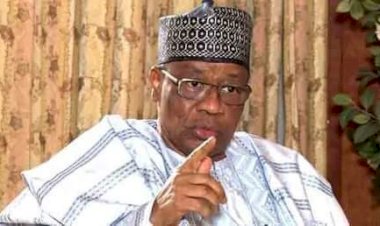Nigeria 2023: Osinbajo’s Chances Grow Slimmer As Cabal Tightens Grip On Presidency

Feted as an accomplished technocrat who managed to get things done while Buhari was away on repeated bouts of ill health, vice president Yemi Osinbajo angered the cabal surrounding Buhari by sacking DSS security chief Lawal Daura. Since then, his chances of seizing the presidency dwindled, as his opportunities for action have been increasingly curtailed by Buhari's administration.
A long read on Osinbajo's chances ahead of the 2023 presidential poll.
The crowd that gathered at the Sani Abacha Stadium on July 3, to witness the coronation of the 15th Emir of Kano – Aminu Ado Bayero – got more than they bargained for when Osinbajo (the nation’s number two citizen) and Ibrahim Gambari (chief of staff in the office of the president) strode onto the stage at different times, claiming to represent President Muhammadu Buhari.
At the coronation that was attended by several dignitaries, both Osinbajo and Gambari read two different speeches, both reportedly on behalf of Buhari, thereby confusing not just spectators but journalists who had come to cover the event.
While some of the vice-president’s supporters have tried to downplay the gaffe, the incident is just one of many instances that point to his declining role in the current administration.
In recent times, the vice-president has been confined to his constitutional role of heading the National Economic Council and a few ad hoc committees that really have no powers…
Before emerging as Buhari’s running mate in December 2014, Osinbajo had served as the attorney general of Lagos State, during the tenure of former Governor Bola Tinubu. He had been a law professor at the University of Lagos and one of the few who had been privileged to gain the title Senior Advocate of Nigeria.
A charming orator, Osinbajo was also a preacher at the Redeemed Christian Church of God in Lagos and a ‘spiritual son’ to the general overseer of the church, Pastor Enoch Adeboye, who is regarded as one of the most influential religious leaders in the world. He is also married to Dolapo, the granddaughter of the late Chief Obafemi Awolowo, one of the nation’s founding fathers.
Having emerged as Buhari’s running mate only after Tinubu was dropped and asked to handpick his replacement – mainly because he shared the same faith with Buhari – Osinbajo was seen as a proxy to Tinubu.
His lack of experience in partisan politics also meant he had no solid political base and would not be a threat to the president. He was able to worm his way into Buhari’s heart during the start of his tenure, so much so that he got Pastor Okechukwu Enelama – his assistant at the Olive Tree Parish of the church – an appointment as minister for trade and investment in Buhari’s cabinet.
Additionally, his childhood friend – Babatunde Fowler – was appointed as chairman of the Federal Inland Revenue Service (FIRS), one of the highest revenue generating agencies in the country. Osinbajo was also appointed as head of Buhari’s economic management team – which included seven ministers and heads of some government agencies – while a nationwide social investment programme with a budget of billions of dollars was also to be supervised by his office.
Osinbajo Becomes Acting President
Osinbajo’s fortunes showed no sign of waning as a year into Buhari’s first tenure, more powers were bequeathed to him due to the president’s failing health.
Between 2016 and 2018, Buhari frequented the United Kingdom for medical treatment where he stayed for weeks on end. Anytime the president travelled for medical reasons, he would hand over power to Osinbajo no matter how short the trip was; even though the constitution states that he only needed to do so when travelling for over 21 days.
The first time that Buhari embarked on a medical trip to treat an ear infection in the UK was on 6 June, 2016. Though he was would only be gone for two weeks, he handed over power to Osinbajo. However, some members of the president’s inner circle were not comfortable with some of the decisions that Osinbajo made in Buhari’s absence.
Series Of Appointments
Ibrahim Magu, chairman of the Economic and Financial Crimes Commission (EFCC), had been serving in acting capacity for over six months but many in the president’s inner circle didn’t want him confirmed because he had stepped on many toes.
However, immediately after Buhari travelled for his first medical trip, Osinbajo – as acting president – sent a letter to the Senate, requesting Magu’s immediate confirmation. But the cabal were ready to fight back.
Lawal Daura, director-general of Nigeria’s secret police, under the department of state services, who was also the president’s kinsman and a key member of the cabal, sent a damning security report to the Senate, accusing Magu of corruption. On the strength of this letter, the Senate rejected Osinbajo’s request.
But Osinbajo’s influence would increase due to the president’s prolonged absence and declining health.
On 19 January 2017, the president again travelled to the UK on medical leave and Osinbajo assumed power. In Buhari’s absence, Osinbajo’s first move was to write a letter to the Senate to confirm the nomination of the chief justice of Nigeria, Walter Onnoghen, despite the fact that the president had refused to do so for over three months, for unknown reasons. The Senate confirmed this appointment.
Buhari returned after 51 days, looking emaciated but departed for the UK again on 8 May the same year, for 104 days, as his health deteriorated and once again, Osinbajo took over.
During this time, Osinbajo as acting president, sent a request to the Senate again, asking for Magu’s confirmation. But the DSS boss, Daura, again sent a letter, accusing Magu of corruption and asked the Senate not to confirm him. The Senate – headed by Bukola Saraki – willfully rejected Magu. Despite his rejection, Osinbajo retained him as the acting EFCC chairman and even stated publicly that Magu could continue serving as EFCC chairman without Senate confirmation.
Unsettling Buhari’s Inner Circle
Having acquired powers that no vice-president had ever had in the history of Nigeria, Osinbajo was able to make some policy decisions which some powerful members of the president’s inner circle were not comfortable with. As acting president, he appointed more personal aides that only his boss had the power to approve.
He also got some of his allies appointed into government positions like his business partner, Babatunde Irukera, who was named the Executive Secretary of the Consumer Protection Council.
We ask that people desist from such unhelpful permutations while we all deal together with the challenges confronting us as Nigerians…
In May 2017, Osinbajo made 17 appointments in Buhari’s absence which would unsettle the president’s inner circle. The most controversial was that of Funso Doherty as the Director-General of the National Pension Commission.
He also appointed Bolaji Owasanoye as the chairman of the Independent Corrupt Practices and Other Related Offences Commission, a sensitive anti-corruption agency. Osinbajo asked all of them to resume immediately in acting capacity, pending confirmation by the Senate.
Osinbajo’s Soaring Popularity
In Buhari’s absence, Osinbajo’s popularity grew; mainly because he took issues of human rights more seriously than his boss did and was able to introduce some quick policy decisions in contrast with Buhari’s slow style of governance that earned the president the infamous moniker ‘Baba go slow’.
Nigeria’s currency had taken a beating due to a failing economy and a scarcity of dollars. In Buhari’s absence, Osinbajo asked the Central Bank of Nigeria to inject a large volume of dollars into the system which helped to stabilise the naira and reduce inflation. He also differed with Buhari on critical issues such as state police and fiscal federalism.
Many public commentators and social critics praised Osinbajo for his style of governance and publicly wished that Buhari never returned. Some politicians had already begun broaching the idea of Osinbajo becoming the substantive president so they could become his deputy.
Buhari would later make a reference to this while addressing Nigerians in Poland, saying: “A lot of people hoped that I died during my ill health. Some even reached out to the vice-president to consider them to be his deputy because they assumed I was dead. That embarrassed him a lot and, of course, he visited me when I was in London convalescing.”
The Turning Point
Things however took a turn for the worse on 7 August 2018. Buhari had taken one of his regular medical trips to the UK while Osinbajo took over as acting president. In the morning of that day, DSS officials cordoned off the federal parliament and prevented lawmakers from gaining access to the chambers, presumably to change the leadership of the institution which had been at loggerheads with the presidency for several months.
Osinbajo immediately summoned Daura, who was believed to have committed acts of insubordination against the vice-president. Daura, who said he only takes orders from Buhari, was immediately sacked by Osinbajo and later detained.
This is believed to have infuriated the president’s inner circle; but all parties had to maintain a united front ahead of the election which was barely six months away. However, this would be the last time Osinbajo would ever assume the role of acting president.
Things Fall Apart
After the 2019 elections, things began to change. On 25 April 2019, the president travelled to London for 11 days on what he termed a ‘private visit’. But for the first time, he refused to hand over power to Osinbajo as he had done in the last four years.
The president was sued by a human rights activist, Inibehe Effiong, for leaving a leadership vacuum. In his response to the suit, Buhari said he decided not to hand over power to Osinbajo because there was no constitutional requirement for him to do so unless he was going to be absent for 21 days. But things continued to go downhill.
With his political godfather, Tinubu, also seeking to succeed Buhari, it is highly unlikely that Osinbajo may become president.
Osinbajo’s assistant pastor, Enelamah, was not re-appointed as minister of trade and investment, and other appointments made by Osinbajo during Buhari’s absence were rescinded. In August, Buhari created a new ministry – for humanitarian affairs and disaster management – and appointed his long time friend Sadiya Umar Farouq to be in charge of the docket.
Farouq took over the billion-dollar social investment programme that was under Osinbajo’s office, a move that was heavily criticised by Osinbajo’s proxies and both sides began to engage in a media war. In September 2019, Buhari dissolved the economic management team led by Osinbajo and replaced the committee with private sector individuals.
On 28 October 2019, Buhari again embarked on a foreign trip for 21 days without handing over power to Osinbajo. His spokesperson defended the action citing the previous statement from the president. In Buhari’s absence, however, Osinbajo witnessed his biggest challenge yet.
Confined To His Constitutional Role
The president’s chief of staff, Abba Kyari, sacked about 35 of Osinbajo’s aides without informing him. Amid the raging controversy, a spokesman for the president – Garba Shehu – justified the move, saying it was done to save public funds. He also dismissed reports that the relationship between the president and his deputy had turned sour. On his return, Buhari admitted sanctioning the exercise and a project that was initiated to address the crisis between farmers and herders was also taken away from the vice-president.
But more was to come. The vice-president’s childhood friend, Fowler, was not allowed to continue serving as chairman of the tax agency even though his tenure was subject to renewal. Upon his removal, he became a subject of a criminal investigation. Magu, the EFCC chairman whom Osinbajo had tried desperately to keep in office, was also sacked and accused of several acts of corruption.
With the relegation of the vice-president in Buhari’s second term, his chances of emerging as the successor continue to look bleak…
In recent times, the vice-president has been confined to his constitutional role of heading the National Economic Council, an advisory body which comprises the 36 governors in the country. He also heads a few ad hoc committees set up by the president, but that really have no powers of execution. The president has visited the UK for medical treatment at least four times in the last two years, but has made sure never to hand over power to Osinbajo.
However, a few support groups have continued to push for the vice president to succeed his principal. Responding to rumours of his presidential ambition, Osinbajo’s spokesman said in a statement:
“Prof. Osinbajo has not declared any interest whatsoever in the 2023 election, but he is rather focused on working in his capacity as vice-president in the current administration to address all the compelling issues in the country and concerns of Nigerians, including finding effective and lasting solutions to the security challenges. Therefore, we ask that people desist from such unhelpful permutations while we all deal together with the challenges confronting us as Nigerians, and resolve them for the benefit of our people, peace and prosperity in the land.”
However, with the relegation of the vice-president in Buhari’s second term, his chances of emerging as the successor continue to look bleak even though the South-West, where he comes from, seems likely to present the next president. And with his political godfather, Tinubu, also seeking to succeed Buhari, it is highly unlikely that Osinbajo may become president.


















































